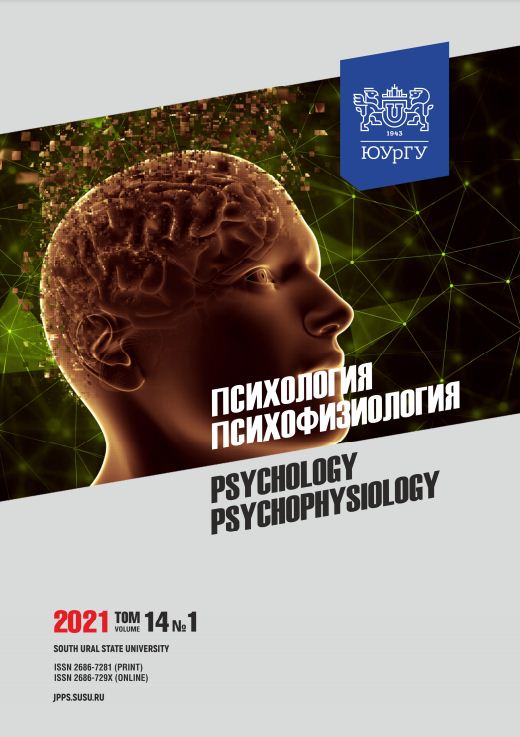CHARACTERISTICS OF CHILDHOOD TRAUMATIC EXPERIENCES IN ADULT PATIENTS WITH PARANOID SCHIZOPHRENIA
Abstract
Abstract. In the absence of sufficient data on the environment-related context of schizophrenia spectrum disorders in Russian clinical psychology, the study of the factors affecting the onset and course of these disorders is becoming increasingly important. Aim. The aim of our research was to study the characteristics of childhood traumatic experience, as well as its relations with psychopathological symptoms in patients with paranoid schizophrenia and possible mechanisms of such relations. Materials and methods: the symptom check list SCL-90 for assessing the severity of psychopathological symptoms, the adverse childhood experience international questionnaire (WHO ACE IQ), the magical ideation scale by M. Eckblad and L. Chapman, the Toronto alexithymia scale TAS-20-R, and a structured questionnaire have been used for the purpose of the study. Results. The obtained data demonstrate that the most frequent types of childhood traumatic experiences were emotional abuse, separation from parents and collective violence, the least frequent psychological traumas are mental illness in family members and sexual abuse. Most respondents report traumatic events as objectively significant. 57 % of respondents do not have the ability to respond to traumatic events, 89 % consider the events subjectively unfair, 46 % believe that traumatic events are relevant at the moment. Prolonged events leading to mental overstrain were of prevailing intensity. A number of types of childhood traumatic experiences have correlations with psychopathological symptoms: physical violence correlates with hostility; emotional abuse has correlations with anxiety and psychoticism; substance abuse by family members correlates with both obsessive-compulsive symptoms and hostility; emotional neglect and collective violence have correlations with psychoticism; bullying correlates with interpersonal sensitivity and anxiety. The overall level of childhood traumatic experience correlates with psychoticism and externally-oriented thinking. Domestic violence correlates with magical ideation. Conclusion: the results of the study suggest that childhood psychological trauma is a risk factor for the development of schizophrenia spectrum disorders, in particular paranoid schizophrenia. Magical ideation and externally-oriented thinking can be included in the mechanism of this relationship.
Downloads
References
2. Identification of risk loci with shared effects on five major psychiatric disorders: a genome-wide analysis. The Lancet. 2013; 381 (9875): 1371–1379. DOI: 10.1016/S0140-6736(12)62129-1
3. Petrova E.A. The phenomenon of psychological trauma: a theoretical aspect. Vestnik Novgorodskogo gosudarstvennogo universiteta im. Yaroslava Mudrogo = Bulletin of the Novgorod State University. Yaroslav the Wise. 2013; 2 (74): 89–91. https://www.elibrary.ru/item.asp?id= 21142356 (in Russ.).
4. Volkova E.N., Isaeva O.M. Child and violence: diagnosis, prediction and prevention. Nizhny Novgorod. 2015: 290. https://www.elibrary.ru/item.asp?id=31052101 (in Russ.).
5. Katan E.A., Karpec V.V., Kotlyarova S.V. et al. Validation of the Russian-language version of the international questionnaire of adverse childhood experiences on a sample of drug addicts. Voprosy narkologii = Addiction issues. 2019; 1-3: 66–85. https://www.elibrary.ru/item.asp?id=36956127 (in Russ.).
6. Hughes K., Bellis M.A., Hardcastle K.A. et al. The effect of multiple adverse childhood experiences on health: a systematic review and meta-analysis. Lancet Public Health. 2017; 2 (8): e356–e366. DOI: 10.1016/S2468-2667(17)30118-4
7. Kendler K.S., Bulik C.M., Silberg J. et al. Childhood sexual abuse and adult psychiatric and substance use disorders in women: an epidemiological and cotwin control analysis. Arch Gen Psychiatry. 2000; 57 (10): 953–959. DOI: 10.1001/archpsyc.57.10.953
8. Gibb B.E., Alloy L.B., Abramson L.Y. et al. History of childhood maltreatment, negative cognitive styles, and episodes of depression in adulthood. Cognitive Therapy and Research. 2001; 25: 425–446. DOI: 10.1023/A:1005586519986
9. Johnson J.G., McGeoch P.G., Caskey V.P. et al. The developmental psychopathology of personality disorders. In B.L. Hankin & J.R.Z. Abela (Eds.), Development of psychopathology: A vulnerability-stress perspective. 2005: 417–464. Sage Publications, Inc. DOI: 10.4135/9781452231655.n15
10. Johnson J.J., Smailes E.M., Cohen P. et al. Associations between four types of childhood neglect and personality disorder symptoms during adolescence and early adulthood: Findings of a community-based longitudinal study. Journal of Personality Disorders. 2000; 14 (2): 171–187. DOI: 10.1521/pedi.2000.14.2.171
11. Berenbaum H., Thompson R.J., Milanek M.E. et al. Psychological trauma and schizotypal personality disorder. Journal of Abnormal Psychology. 2008; 117 (3): 502–519. DOI: 10.1037/0021-843X.117.3.502
12. Walker E., Kestler L., Bollini A., Hochman K.M. Schizophrenia: etiology and course. Annual Review of Psychology. 2004; 55: 401–430. DOI: 10.1146/annurev.psych.55.090902.141950
13. van Winkel R., Stefanis N.C., Myin-Germeys I. Psychosocial stress and psychosis. A review of the neurobiological mechanisms and the evidence for gene-stress interaction. Schizophrenia bulletin. 2008; 34 (6): 1095–1105. DOI: 10.1093/schbul/sbn101
14. Selten J.-P., Cantor-Graae E. Social defeat: risk factor for schizophrenia? The British Journal of Psychiatry. 2005; 187: 101–102. DOI: 10.1192/bjp.187.2.101.
15. Collip D., Myin-Germeys I., Van Os J. Does the concept of «sensitization» provide a plausible mechanism for the putative link between the environment and schizophrenia? Schizophrenia bulletin. 2008; 34 (2): 220–225. DOI: 10.1093/schbul/sbm163.
16. van Winkel R., van Nierop M., Myin-Germeys I., van Os J. Childhood trauma as a cause of psychosis: linking genes, psychology, and biology. The Canadian Journal of Psychiatry. 2013; 58 (1): 44–51. DOI: 10.1177/070674371305800109
17. Sekoyan I.E. Alexithymia: predictor, sign of psychosomatization or personal characteristics. Nezavisimyi psikhiatricheskii zhurnal = Independent psychiatrist journal. 2007; 4: 22–28. https://www.elibrary.ru/item.asp?id=12830098 (in Russ.)
18. Sychugov E.M., Dorofeev E.V., Senina E.N. et al. Severity of schizotypical manifestations and features of the functional asymmetry of the brain. Meditsinskii almanakh = Medical almanac. 2018; 5: 153–159. DOI: 10.21145/2499-9954-2018-5-153-159 (in Russ.).
19. George L., Neufeld R.W. Magical ideation and schizophrenia. Journal of Consulting and Clinical Psychology. 1987; 55 (5): 778–779. DOI: 10.1037//0022-006x.55.5.778
References on translit
.Copyright (c) 2021 Psychology. Psychophysiology

This work is licensed under a Creative Commons Attribution-NonCommercial-NoDerivatives 4.0 International License.



